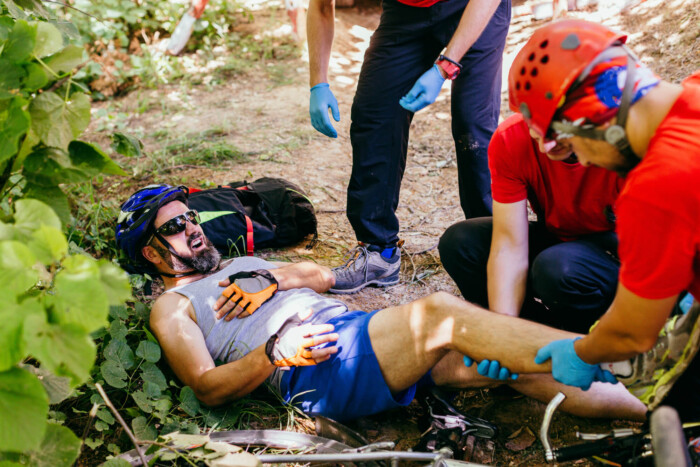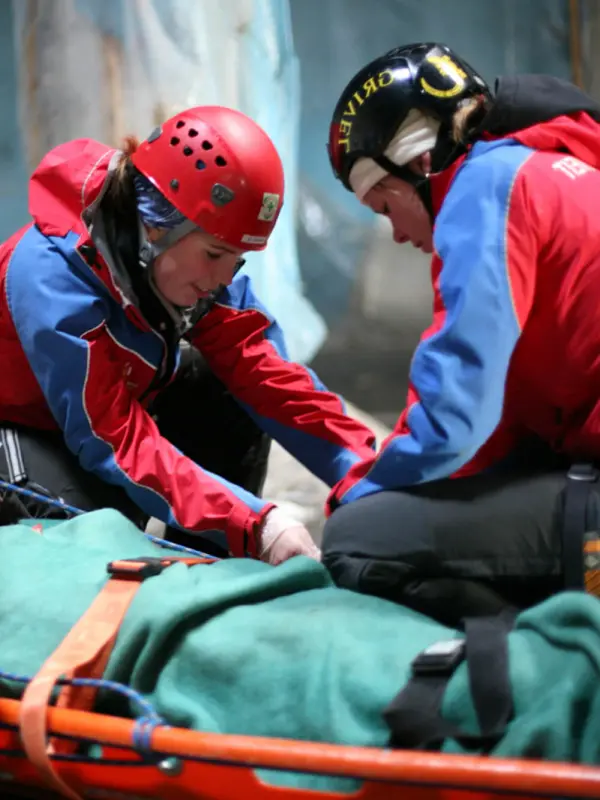Wilderness EMS Upgrade
- Minimum Duration
- 45 Hours
- Minimum Age
- 18
- Minimum Cost
- $675+ USD
- Skill Level
- Basic EMT+

Description
WEMS helps providers apply their scope of practice in prehospital and remote settings. Participants include Advanced Practice Providers, Registered Nurses, EMTs/Paramedics, SAR medical leaders, expedition medics, DMAT members, military medics, and those preparing for the WP-C test. Interdisciplinary providers are intentionally mixed during performance tasks to promote future collaboration in the field.
Curriculum
This course requires pre-course work customized to the student’s level on an e-learning platform. In-class learning involves lecture, discussion, patient assessment drills, case study review, and BLS and ALS skills labs. Content and context are synthesized through progressive scenario simulations requiring treatment, formulation of evacuation plans, and coordination of emergency resources and personnel.
Requirements
Current EMS or other professional medical certification is required.
Prior to enrolling, please review our Functional Position Description. The criteria in this policy allow students to self-assess their ability to meet the demands of a WMA International course as well as the demands of a certified wilderness medical provider in the field.
Evaluation
This course is pass/fail. 100% attendance is mandatory for certification. Evaluation is based on practical patient simulations, hands-on activities, and a written test. WMA International is committed to making reasonable accommodation for any student with special needs.
Recertification
Certifications are valid for three years. Graduates of this course may re-certify by repeating this course or by taking a Wilderness First Responder Recertification course (WEMS specific pre-course work will be required).
Course Technology Requirements
To access the pre-course work, students must have:
- High speed Internet Access
- A computer with:
- a PDF Reader
- Anti-Virus Software
- Internet Browser (latest version of Chrome, Firefox, or Edge). Note- the system is NOT compatible with Safari.
Course Content
This course includes most material in a standard Wilderness First Responder course with additional information or emphasis on:
- Crew resource management and a culture of safety (Just Culture) to illustrate how human factors play a role in team dynamics, safety, and effective resuscitation and rescue.
- An overview of incident command systems frequently used in Search and Rescue, disaster medicine, or interagency operations.
- Managing patients in prolonged care settings with emphasis on major bleeds, ischemia, infection, rhabdomyolysis, and functional needs.
- Non-technical components of lifting, moving, and extricating patients from small spaces, and through difficult to navigate terrain. This includes exposure to rescue litters.
- Patient packaging for extended travel. Emphasis is placed on use of vacuum mattresses and warming systems most commonly used in remote care situations.
- BLS and ALS skills labs focus on appropriate medical technology relative to the provider’s scope of practice, including medication and fluid administration, injections, and airway and ventilation management.
- The development of a concise patient problem list and emphasis on patient reporting via various technological tools such as radios, phones, satellite devices, etc.
Course Content
This course includes most material in a standard Wilderness First Responder course with additional information or emphasis on:
- Crew resource management and a culture of safety (Just Culture) to illustrate how human factors play a role in team dynamics, safety, and effective resuscitation and rescue.
- An overview of incident command systems frequently used in Search and Rescue, disaster medicine, or interagency operations.
- Managing patients in prolonged care settings with emphasis on major bleeds, ischemia, infection, rhabdomyolysis, and functional needs.
- Non-technical components of lifting, moving, and extricating patients from small spaces, and through difficult to navigate terrain. This includes exposure to rescue litters.
- Patient packaging for extended travel. Emphasis is placed on use of vacuum mattresses and warming systems most commonly used in remote care situations.
- BLS and ALS skills labs focus on appropriate medical technology relative to the provider’s scope of practice, including medication and fluid administration, injections, and airway and ventilation management.
- The development of a concise patient problem list and emphasis on patient reporting via various technological tools such as radios, phones, satellite devices, etc.
